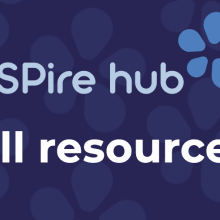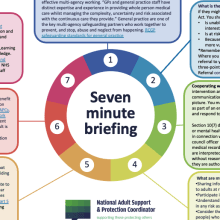Kay Leary is a social worker with experience in both children and adult social work services. For the last year she has been working as an Adult Support and Protection audit, learning, and development worker, which has a specific focus on adults’ engagement in the design and delivery of social work services.
Gwyneth Lennox previously worked across a range of adult social work services, including roles specific to public protection, but has recently moved to children’s services covering throughcare/aftercare, unaccompanied asylum-seeking children, youth justice and adult justice social work.
What are we doing about Professional Curiosity in the Scottish Borders?
Improving chronologies is a national challenge and features on most Joint Inspection reports across Scotland in relation to both adults and children’s services. This is as much a challenge in the Scottish Borders as it is across the rest of the country. Here in the Borders, we want to change this. Alongside a desire to improve our chronologies, making them more analytical, we are also thinking about how we can develop a culture of professional curiosity across partner agencies.
This thinking started to develop some time ago as it became more apparent there was a strong connection between chronologies that tell the history of service users' lives, analysis of those events which provide insight to enable us to make sense of that history, and professional curiosity which ensures we ask questions and consider the impact of those life events. To this end we decided to form a whole family, multi-agency workstream, we called it ‘CAP’ in its short form as the full title was a bit too long – Chronologies, Analytical writing, and Professional Curiosity.
But why is Professional Curiosity so important? And why put these three practices together?
We often fall into the trap of seeing chronologies as factual, standing alone, process driven, rather than being seen as a tool to record and support analysis and provoke that further curiosity. Hence the decision was taken to look at the three themes of CAP in recognition of how analytical writing and critical thinking can be the bridge that links chronologies and professional curiosity together.
The workstream is about getting agencies together, to talk, recognising that while our systems are set up differently our commonalities guide our shared principles. We have sought feedback through staff surveys and focus group discussions with practitioners to understand their use of professional curiosity and the barriers to promoting it. This means we can benchmark our starting point. Staff engagement to promote the involvement of services has been beneficial and is helping us to refresh our local guidance on both chronologies and professional curiosity. Whilst there is a shared understanding of professional curiosity, many staff are telling us they are only moderately confident in applying this in practice.
What are we hoping to achieve?
Going forward, supporting staff to have time to talk with peers within and outwith their teams is seen as one of the most important ways to analyse and promote professional curiosity. Better use and understanding of chronologies, supervision, management support and peer reflection is also a way to improve professional curiosity. We want staff to feel confident in applying analysis and curiosity to how they approach assessments and decision-making. This, we believe, supports ethical and values-led practice.
The inclusion of analytical writing and professional curiosity is a different way of reframing chronologies, and it’s hoped that this will lead to more sustainable improvements by embedding this approach into core practice. The workstream includes representation from health, police, education, justice, the Care Inspectorate, children and adult social work services. By the end of this workstream we hope to have produced updated local practice standards on both chronologies and professional curiosity that is linked to national guidance and supported by sound research principles - and we hope to share this on the ASPire Hub when it's ready. Most importantly, we want this improved practice to steer us towards better engagement and outcomes for service users, families, and carers in our communities.




